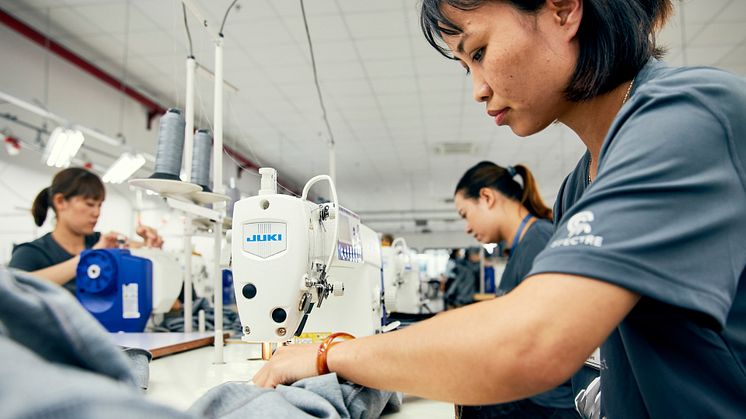
Pressemeddelelse -
Navigating private label apparel manufacturing for emerging entrepreneurs
Launching a brand in the apparel industry is an exhilarating yet complex adventure. It's a journey replete with opportunities to leave a mark on fashion. For entrepreneurs at the onset of this path, the intricacies of clothing production can seem overwhelming.
This guide sheds light on private label apparel manufacturing—a strategic choice for those aspiring to craft a distinctive brand while navigating the competitive landscape efficiently. We'll delve into choosing an adept manufacturing partner, the nuances of different types of manufacturers, and additional pivotal factors vital for your brand's inception and growth.
Understanding private label apparel
Private label clothing refers to items manufactured by a third-party but retailed under your personal brand name. This arrangement enables entrepreneurs to focus on developing their brand and executing marketing tactics while delegating the intricate aspects of production to experienced manufacturers.
Choosing to go the route of private label manufacturing represents a practical and economical strategy for entering the clothing market, particularly for those aiming to introduce custom products without the substantial upfront cost of establishing their own manufacturing operations.
What to look for in manufacturing partners
Choosing an ideal manufacturing collaborator is crucial for entrepreneurs stepping into the realm of private label clothing ventures. Such a decision profoundly impacts the caliber of your offerings, the smoothness of your supply chain, and, fundamentally, your brand's triumph.
A diverse pool of manufacturers, each with their unique set of skills and services, makes it imperative to discern carefully what criteria are most relevant. Essential factors to consider include the manufacturer's depth of experience, adherence to ethical standards, effectiveness in communication, and the ability to scale operations in alignment with business growth.
This critical early decision not only forms the bedrock of a synergistic partnership but also aligns your business operations with the core values and objectives of your brand, setting the stage for prosperity amidst the fierce competition of the apparel market.
Specialisation vs generalisation
Identifying the right manufacturing partner is crucial; it's about understanding the difference between specialised and general manufacturers. Specialised partners are experts in particular apparel categories, such as outdoor wear, necessitating materials and designs that endure environmental challenges. They possess expertise in crafting garments equipped with technical fabrics, waterproofing, and durability—crucial for outdoor apparel. Conversely, general manufacturers handle a broad spectrum of products but might lack the niche expertise specific segments demand.
Domestic vs international production
Choosing between domestic and international manufacturers is another pivotal decision. Domestic production can offer benefits like reduced lead times, ease of communication, and supporting local economies, albeit often at higher costs. International manufacturing might lower expenses but necessitates meticulous management of logistics, quality assurance, and may involve longer lead times.
Understanding the private label journey
Embarking on the private label journey marks the beginning of an exciting chapter for entrepreneurs eager to make their mark in the apparel industry. This venture involves transitioning from concept to tangible product, navigating through the intricacies of design, production, and market introduction under your brand name.
Understanding this journey is crucial for seamlessly blending creative vision with pragmatic business strategies. It encompasses identifying the right manufacturing partners, perfecting product designs, ensuring quality control, and mastering the art of branding and marketing.
This comprehensive approach not only facilitates the successful launch of your apparel line but also sets a solid foundation for sustained growth and innovation in the fast-paced world of fashion.
From concept to product
The journey begins with design and product development, transforming your brand concept into tangible items. This phase is about defining technical specifications, selecting materials, and integrating design elements that embody your brand ethos.
Sampling
Prior to mass production, creating prototypes is essential. This step enables you to evaluate the product's quality, fit, and aesthetic appeal, ensuring they align with your vision and market expectations.
Ensuring quality in production
Following sample approval, the production phase unfolds. Maintaining stringent quality control is critical, necessitating periodic checks to ensure the final products adhere to your specified criteria and quality benchmarks. Effective communication with your manufacturer is vital to promptly address any concerns.
Strategic considerations
To thrive in the competitive arena of the clothing industry, an entrepreneur needs more than just a sharp fashion sense; it calls for strategic vision and detailed preparation. In such a scenario, laying out strategic frameworks is critical for anyone looking to carve out a successful space for their private label brand.
This approach requires a comprehensive plan covering market analysis, establishing brand identity, financial structuring, and enhancing the efficiency of the supply chain, among other key areas. Tackling these areas enables entrepreneurs to develop a business strategy that is both robust and flexible, capable of adapting to the changing trends of the market.
Focusing on these essential strategies helps emerging brand creators to navigate growth sustainably, making sure their brand not only debuts with significance but also continues to stand out in the vibrant and ever-changing fashion industry.
Ethical practices and sustainability
In today’s market, consumer awareness about sustainability and ethical practices in manufacturing is surging. Opting for partners who prioritize these values can not only elevate your brand's image but also cater to a growing demographic concerned with the impact of their purchasing choices.
Safeguarding your brand
Protecting your designs and brand identity is essential in a competitive landscape. Your manufacturing agreement should include clauses that protect your intellectual property, ensuring your brand's uniqueness remains uncompromised.
Distribution and logistics
Consider the logistics of distributing your products from the factory to the consumer. Establishing efficient distribution networks is key to ensuring timely deliveries and maintaining customer satisfaction.
Related links
Aveo.dk er et full service webbureau, der hjælper erhvervsdrivende med at få online succes.

